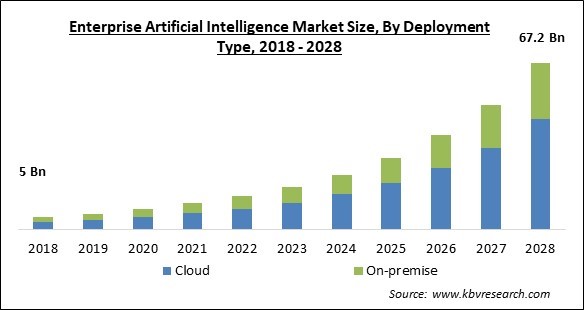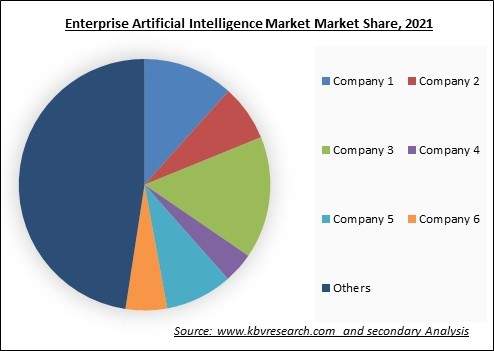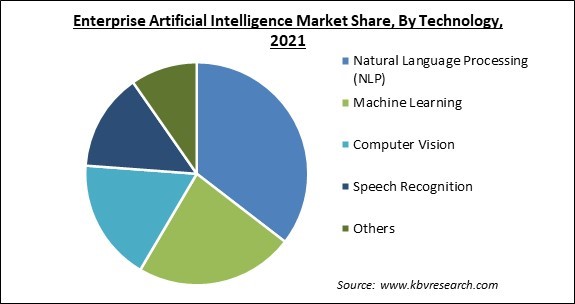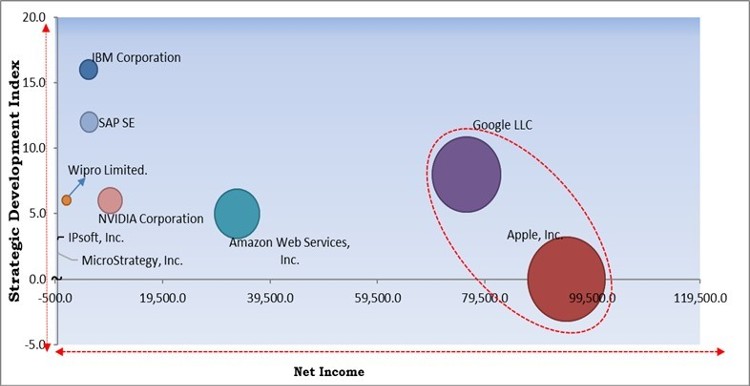The Global Enterprise Artificial Intelligence Market size is expected to reach $67.2 billion by 2028, rising at a market growth of 30.9% CAGR during the forecast period.
With the use of artificial intelligence (AI), computer systems can create and carry out tasks like speech recognition, visual perception, decision-making, and language translation which ordinarily require human involvement and assistance. Depending on each person's perspective, artificial intelligence (AI) may mean different things to different individuals. Personalized bots, computers which can identify disease, and self-driving cars, for example, are presently being seen as AI.

A few years ago, a browser's recommendation engine may be considered AI.The creation and revision of this technology presents huge intellectual obstacles to the manufacturers in the enterprise Artificial Intelligence (AI) sector. The industry for artificial intelligence is driven mainly by bigger data integration, varied application areas, higher efficiency, and increased customer satisfaction.
The most important development in the market is the digitalization of businesses. The Internet of Things, intelligent robots, information management, artificial intelligence, mobile supercomputing, ubiquitous, and analytics are just a few examples of the cutting-edge digital and physical technologies that make up the fourth industrial revolution (Industry 4.0), which has a massive effect on many different industries.
Robotics and automated technologies are becoming increasingly popular as a result of the broad adoption of Industry 4.0, which is helping to increase the productivity of production operations.AI is increasingly being used by businesses to create "virtual agents," also known as chatbots, that can perform basic requests and tasks that call centres get. This improves the customer experience. As a result, the companies' manufacturing costs have decreased due to the use of less labour.
Every industry in the world was significantly impacted by the COVID-19 pandemic. Though, the enterprise artificial intelligence (AI) market expanded as a result of the pandemic's increasing need for innovative and cutting-edge AI-based enterprise products across a number of industries, including retail, healthcare, and education. With the aid of Amazon Elastic Compute Cloud, UC San Diego Health, an academic medical centre inside the University of California, will launch an imaging algorithm based on machine learning in July 2020 which can identify symptoms of COVID-19. This is a challenging task given AI's rapid progress and wide range of applications.
The ability of artificial intelligence (AI) technology to effectively assess the data gathered and forecast decisions via critical algorithms aids in productivity development; as an illustration, Netflix proposes movies based on customers' prior viewing habits. AI has completely changed how businesses are managed in the present business environment by integrating technologies for workflow management, trend predictions, brand purchase advertising, and other things. These are the main causes of the rising investment in artificial intelligence technologies.

The leading players in the market are competing with diverse innovative offerings to remain competitive in the market. The below illustration shows the percentage of revenue shared by some of the leading companies in the market. The leading players of the market are adopting various strategies in order to cater demand coming from the different industries. The key developmental strategies in the market are Acquisitions, and Partnerships & Collaborations.
Media & advertising, retail, finance, healthcare, agriculture, educational institutions, oil & gas, automotive & transportation, legal, and other industries are just a few of the many fields where AI is used. Due to advancements like self-driving cars, precise weather forecasts, space exploration, and others, this has propelled the AI market globally. Due to its capacity to evaluate vast volumes of genomic data and assure more precise prevention and treatment of medical disorders, AI is also anticipated to have an impact on healthcare breakthroughs.
It is an impressive achievement when a machine can mimic human intelligence. It can be very expensive and takes a lot of time and resources. AI is highly expensive because it requires the newest hardware and software to function in order to stay current and meet criteria. The inability of AI to learn to think creatively beyond the box is a significant drawback. Using pre-fed data and prior experiences, AI is able to learn over time, however it is not able to take a novel method. Only information that has already been sent to the bot is contained in these reports.
On the deployment type, the enterprise artificial intelligence market is bifurcated into Cloud and On-premises. The on-premise segment garnered a significant revenue share in the enterprise artificial intelligence market in 2021. The rise in worries over the security of data pertaining to personal information, research, account transactions, and other types of data could be ascribed to the expansion of the segment. Along with that, the rising cybersecurity attacks would motivate companies to opt on-premise solutions, which would spur the growth of the segment.

By technology, the enterprise artificial intelligence market is segmented into Natural Language Processing (NLP), Machine Learning, Computer Vision, Speech Recognition and Others. Machine learning (ML) segment registered a significant revenue share in the enterprise artificial intelligence market in 2021. It is due to the rise in the number of companies opting for advanced solutions and products. With the use of machine learning (ML), which is a form of artificial intelligence (AI), software programmes can predict results more accurately without having to be specifically instructed to do so.
Based on organization size, the enterprise artificial intelligence market is classified into Large Enterprises, and Small and Medium Enterprises. The large enterprises segment acquired the largest revenue share in the enterprise artificial intelligence market in 2021. This market's expansion can be attributable to factors including the growing demand for productivity improvements, infrastructure cost savings, and an improvement in flexibility and agility through the elimination of redundant jobs.
On the basis of vertical, the enterprise artificial intelligence market is fragmented into Media & Advertising, Retail, BFSI, IT & Telecom, Healthcare & lifesciences, Automotive & Transportation and Others. The retail segment procured a substantial revenue share in the enterprise artificial intelligence market in 2021. By enabling data democratization to implement use cases such as demand forecasting, dynamic pricing, and more, enterprise AI enables retailers to dramatically expand AI operations.
| Report Attribute | Details |
|---|---|
| Market size value in 2021 | USD 10.5 Billion |
| Market size forecast in 2028 | USD 67.2 Billion |
| Base Year | 2021 |
| Historical Period | 2018 to 2020 |
| Forecast Period | 2022 to 2028 |
| Revenue Growth Rate | CAGR of 30.9% from 2022 to 2028 |
| Number of Pages | 310 |
| Number of Tables | 483 |
| Report coverage | Market Trends, Revenue Estimation and Forecast, Market Share Analysis, Segmentation Analysis, Regional and Country Breakdown, Competitive Landscape, Companies Strategic Developments, Company Profiling |
| Segments covered | Technology, Organization Size, Deployment Type, Vertical, Region |
| Country scope | US, Canada, Mexico, Germany, UK, France, Russia, Spain, Italy, China, Japan, India, South Korea, Singapore, Malaysia, Brazil, Argentina, UAE, Saudi Arabia, South Africa, Nigeria |
| Growth Drivers |
|
| Restraints |
|
Region-wise, the enterprise artificial intelligence market is analyzed across North America, Europe, Asia Pacific and LAMEA. North America emerged as the leading region in the enterprise artificial intelligence market with the highest revenue share in 2021. The market in the region is being driven by elements including the presence of top organizations that create AI solutions & services, technological infrastructural, and the substantial number of end users employing data management devices.
Free Valuable Insights: Global Enterprise Artificial Intelligence Market size to reach USD 67.2 Billion by 2028

The major strategies followed by the market participants are Acquisitions. Based on the Analysis presented in the Cardinal matrix; Google LLC and Apple, Inc. are the forerunners in the Enterprise Artificial Intelligence Market. Companies such as Amazon Web Services, Inc., IBM Corporation, SAP SE are some of the key innovators in Enterprise Artificial Intelligence Market.
The market research report covers the analysis of key stake holders of the market. Key companies profiled in the report include Google LLC, Amazon Web Services, Inc., IBM Corporation, Apple, Inc., SAP SE, Wipro Limited., MicroStrategy, Inc., NVIDIA Corporation, Verint Systems, Inc., and IPsoft, Inc.
By Vertical
By Deployment Type
By Organization Size
By Technology
By Geography
The global Enterprise Artificial Intelligence Market size is expected to reach $67.2 billion by 2028.
Rising Investments In Ai Technologies By The Companies are driving the market in coming years, however, Huge Cost Attached To The Implementation Of Enterprise Ai restraints the growth of the market.
Google LLC, Amazon Web Services, Inc., IBM Corporation, Apple, Inc., SAP SE, Wipro Limited., MicroStrategy, Inc., NVIDIA Corporation, Verint Systems, Inc., and IPsoft, Inc.
The Cloud segment acquired maximum revenue share in the Global Enterprise Artificial Intelligence Market by Deployment Type in 2021 thereby, achieving a market value of $44.6 billion by 2028.
The Natural Language Processing (NLP) segment is leading the Global Enterprise Artificial Intelligence Market by Technology in 2021 thereby, achieving a market value of $21.9 billion by 2028.
The North America market dominated the Global Enterprise Artificial Intelligence Market by Region in 2021, and would continue to be a dominant market till 2028; thereby, achieving a market value of $24.6 billion by 2028.
Our team of dedicated experts can provide you with attractive expansion opportunities for your business.

